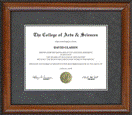Graduate Studies

Thesis and Dissertation Deposit Information Resources
ORCID IDs
Date of this Version
11-2012
Abstract
1. Your dissertation (and any other creative work) is already automatically copyright in your name as soon as it assumes "fixed form," i.e., as soon as it is written. It's publication (or deposit) in ProQuest's dissertations database or in the UNL DigitalCommons provides an independently verified date of record. So— No, you do not need to copyright your dissertation; that happens already automatically.
2. ProQuest asks if my dissertation is already or previously copyrighted. What does that mean? Do I answer yes or no? Sometimes, on rare occasions, a graduate degree is awarded based on a document that has already been published (and copyrighted) before it is deposited as an official dissertation. If that is the case, answer "yes." Otherwise (and normally), the answer should be "no."
3. ProQuest asks if I wish for them to register the copyright in my dissertation; what does that mean? Copyrights can be (but are not required to be) "registered" with the U.S. Copyright Office. This used to be required to get the protection of copyright for the full term, but that is no longer the case. Copyright belongs to the author automatically for the full 95-year term (currently) whether it is registered or not.
What is the point of registering? If you find someone has infringed on your copyright and you want to sue them and collect monetary damages, you can only collect damages back to the date of the official registration. You can stop them from infringing, but you cannot collect damages for infringement that happened prior to the registration date.
Is there a cut-off for registering? No, you can register your copyright at any time. You can register copyright yourself: Basic registration fee is $35 if done online, $65 if done on paper. ProQuest's charge for doing it for you at the time of deposit is $75. The United States Copyright Office is @ http://www.copyright.gov/
Registration, however, does not guarantee a work's copyright. For example, the Copyright Office might register your claim to copyright of a document that is actually taken from other (already copyrighted) sources or material that is legally in the public domain. In order for copyright to be valid, the material has to be legally subject to copyright, and registration does nothing for that one way or another.
So, should I have ProQuest register copyright for me? Short answer: for an academic dissertation, probably not. (But it's your money; better to spend it on that than to blow it on drugs, tattoos, and Nicki Minaj downloads.)

